Tikanga Māori connected people through shared experiences and was part of a collective effort to create a safe and welcoming place to work in.
Weaving Māori principles into the Lab
This saw members weaving into Lab life, the Māori principles of whanaungatanga and manaakitanga - connecting people through shared experiences and creating a safe and welcoming place to work in.
Many of the team were able to recite their pepeha - introduce themselves in Māori and briefly describe the places of significance to them. They learned basic Māori, sang waiata and recited karakia before key meetings.
This left an impression on people from other agencies. On some it had quite a profound effect, creating a willingness to learn more, especially when public servants suddenly became aware of just how many of their ‘customers’ were Māori and how little tikanga featured in service design.
Mihi whakatau
Every visitor experienced a whakatau or mihimihi, cultural practices Māori use to ensure manuhiri are treated with respect and go home with an experience to remember. For more formal welcomes, a mihi whakatau,was essential to the practice of whanaungatanga because connection between people was a central tenet of the Lab. The Lab had many domestic and international visitors. Manuhiri were sent information before their visit. Staff met them at the door and provided further information to ensure they were comfortable with the practice. Once inside, a hongi was performed. This saw the visitors gently pressing noses to symbolise the sharing of Haa/breath - acknowledging the first breath of mankind according to Māori history.
After this came a whaikorero / speeches between the hosts and manuhiri followed by a waiata. Manuhiri responded with their own speech generally in a language they were comfortable with.
A large Vietnamese delegation delighted everyone when they responded with their own welcoming song in Chinese about Ho Chi Minh City - most visitors being too shy to attempt this challenge. Their singing was joyful, bringing both groups closer despite one of the most significant language barriers the team had been faced with from a visiting group.
Visitors to the Service Innovatin Lab
Once the formal welcome and sharing of kai / food was completed the tour proceeded. International visitors are increasingly interested in exchanging ideas and seeing how innovative governments are becoming in delivering their services; they particularly loved the unique cultural experience that came as an integral part of their visit to the Lab. Many delegations later tell their host agencies their Lab experience was a highlight of their New Zealand visit.
None of this would have been possible without the expertise of a Māori employee Tiopira Piripi who was well rehearsed in tikanga Māori and was a valuable adviser. Visitors have included OECD Deputy Secretary General Ulrik Vestergaard Knudsen, D9 Secretariat Jordan Storozuk, New South Wales Government Chief Information and Digital Officer Greg Wells, and delegations from the Pacific, Vietnam, Canada, the United Arab Emirates and Saudi Arabia.
Feedback
“The Service Innovation Lab is in the business of co-creation in a safe space, so our welcomes are about caring and making people feel connected, welcome and safe.”
- Karl McDiarmid, Former Service Innovation General Manager.
“All the international visitors were really drawn to the ideation and delivery of services across agencies - this really resonated with them.”
- Simeon Berry, Commercial Manager B2B, New Zealand Trade and Enterprise



